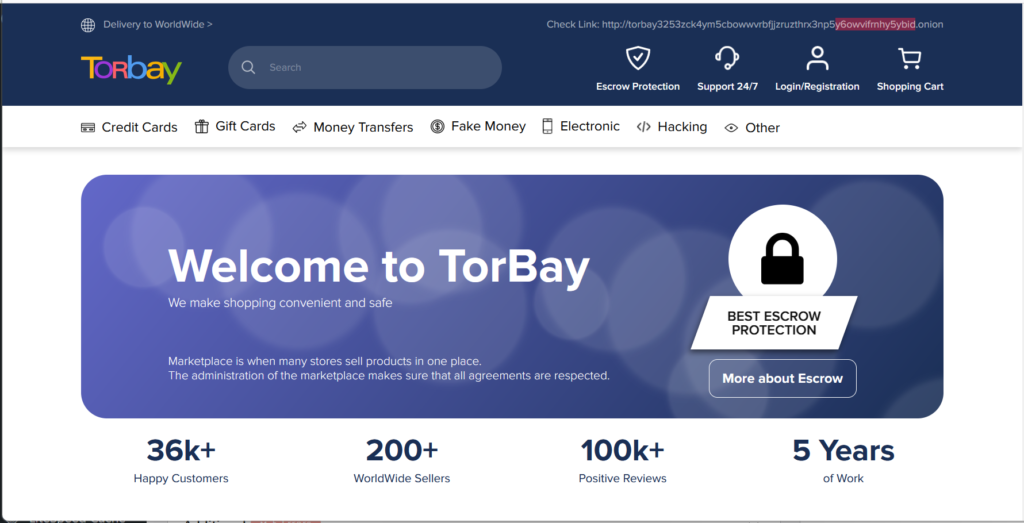Table of Contents
ToggleTorbay – TOR Scam Report (1)
Onion Link: http://torbay3253zck4ym5cbowwvrbfjjzruzthrx3np5y6owvifrnhy5ybid.onion
Scam Report Date: 2024/05/07
Client Scam Report Breakdown
Original Report Summary:
The user reports placing an order through TorBay, a deep web marketplace that advertises various illegal products and services such as credit cards, fake money, hacking tools, and gift cards. After initiating contact with both the seller and customer support, the user was assured that the order had been received and forwarded to the seller. The scam report reveals a delay in processing after the user’s payment was confirmed on the blockchain. The seller informed the user that the order would be completed in 12 hours, despite the user paying for expedited processing. However, after the charge was confirmed, neither the seller nor support were responsive to further communications. Furthermore, when the user attempted to raise a new support ticket, the system displayed an error indicating that the order could not be found in the system. This lack of communication and system error reflects common scam patterns on deep web marketplaces.
Photos:

The report outlines multiple red flags that suggest fraudulent activity. Firstly, after the user’s payment was registered via the blockchain—a decentralized ledger system that verifies cryptocurrency transactions—there was an unexpected delay in processing the order. Blockchain payments are generally considered irreversible, making them a common method for conducting transactions in illegal marketplaces. Despite paying extra for immediate order fulfillment, the seller delayed the completion of the transaction. The seller’s message promising delivery within 12 hours can be seen as a stalling tactic, which is a frequent indicator of an impending scam. The absence of any follow-up communication from both the seller and the marketplace’s support team further deepens the suspicion of fraud. The fact that the user could not raise a support ticket regarding the issue adds to the problematic nature of this particular scam, as it prevents users from escalating their concerns or resolving disputes.
Escrow protection—a service frequently touted by marketplaces like TorBay—is meant to provide a safety net for users, ensuring that payment is only released to the seller once the buyer confirms receipt of the goods. However, in this case, the supposed protection failed. Many of these deep web platforms claim to provide escrow services to enhance trust, but in reality, the marketplaces often collude with fraudulent sellers to scam users out of their money. The user’s inability to submit a support ticket regarding the order raises concerns about the integrity of the marketplace’s internal processes. This situation highlights the challenges customers face when navigating the underground economy, where communication channels can be blocked, and fraudulent activity is difficult to dispute. It also underscores the importance of being vigilant when dealing with anonymous vendors who can easily disappear after receiving payment.
By analyzing this scam report, it becomes evident that marketplaces like TorBay continue to exploit users’ trust by offering features like escrow protection, which in practice are not upheld. The systemic nature of this scam—lack of responsiveness after payment, failure to process tickets, and untraceable orders—mirrors common fraudulent schemes that leave buyers without recourse. Although the platform claims to provide safeguards such as fast shipping, anonymity, and 24/7 support, users are often left unprotected once their cryptocurrency is transferred. This case exemplifies the growing trend of scams within illegal marketplaces and the difficulties of recovering lost funds in these environments.






